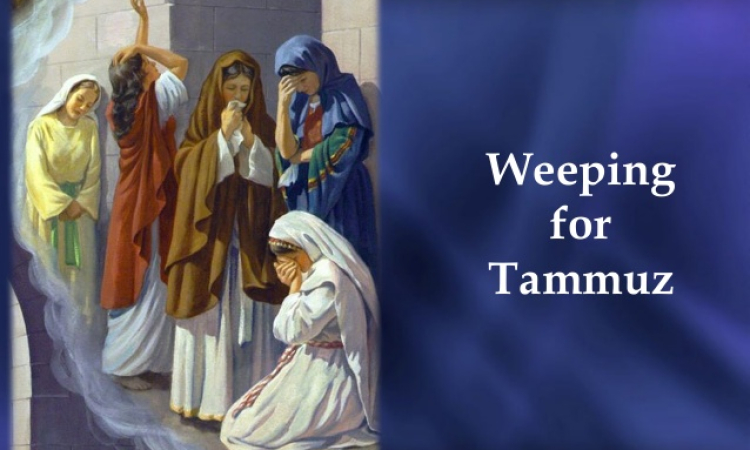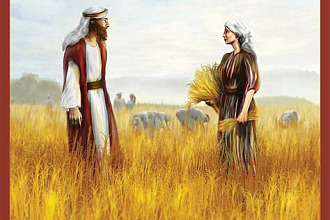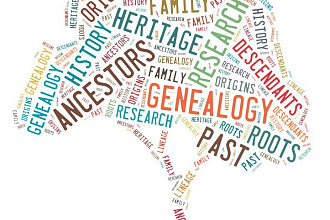The Jewish prophet Ezekiel spoke of Israel’s captivity in Babylon and was shown some interesting things by God that were causing problems with Israel’s relationship with God.
“Then He[God] said to me, ‘Son of man, have you seen what the elders of the house of Israel do in the dark, every man in the room of his idols? For they say, “The Lord does not see us, the Lord has forsaken the land.”’ And He said to me, ‘Turn again, and you will see greater abominations that they are doing.’ So He brought me to the door of the north gate of the Lord’s house; and to my dismay, women were sitting there weeping for Tammuz.” Ezekiel 8:12-14
But who or what was Tammuz, what did the weeping mean, and why was it considered an abomination? Many people assume the Bible is just made up of stuff, but we now know Tammuz was believed to be a handsome shepherd sun god of the ancient Babylonians. The death of Tammuz by a wild pig, which was said to represent winter, was mourned as the cause behind the death of vegetation, and whose resurrection was thought to bring life in the form of the rainy season in the spring. (Orr, James, M.A., D.D. n.d).
When the days became shorter the Babylonians held a funeral, which lasted six days, for the god, but the cult practice was widely regarded in the ancient east and ancient tablets discovered reveal the accuracy of the Bible’s description of Tammuz worship (“Tammuz (god)”, n.d). One can read an example of the mourning for Tammuz “‘O Dumuzid of the fair-spoken mouth, of the ever kind eyes,’ she sobs tearfully, ‘O you of the fair-spoken mouth, of the ever kind eyes,’ she sobs tearfully. ‘Lad, husband, lord, sweet as the date, [...] O Dumuzid!’ she sobs, she sobs tearfully.” (“Tammuz”, 2015). We can easily see why the God of Israel would have a problem with this and why the worship of false gods was often compared to adultery.
Why should Israelites weep for this “god” and worry about what to eat when the God of Israel said, “‘Do not fear, for you will not be ashamed; neither be disgraced, for you will not be put to shame; for you will forget the shame of your youth, and will not remember the reproach of your widowhood anymore. For your Maker is your husband, the Lord of hosts is His name; and your Redeemer is the Holy One of Israel; He is called the God of the whole earth. For the Lord has called you Like a woman forsaken and grieved in spirit, Like a youthful wife when you were refused,’ Says your God.” Isaiah 54:4-6
The Bible says, “The Lord is my shepherd; I shall not want.” Psalm 23:1 “Reverence for the Lord is pure, lasting forever. The laws of the Lord are true; each one is fair. They are more desirable than gold, even the finest gold. They are sweeter than honey, even honey dripping from the comb.” Psalm 19:9-10 Regarding, the Messiah described by the Jewish prophet Isaiah, “For unto us a Child is born, unto us a Son is given; and the government will be upon His shoulder. And His name will be called Wonderful, Counselor, Mighty God, Everlasting Father, Prince of Peace.” Isaiah 9:6 King David said, “My heart is overflowing with a good theme; I recite my composition concerning the King; my tongue is the pen of a ready writer. You are fairer than the sons of men; Grace is poured upon Your lips; therefore God has blessed You forever.” Psalm 45:1-2.
God was trying to teach people the folly of depending on other things, but instead people were turning to another “god” to shepherd them and calling his ways sweet instead. The weeping for Tammuz by Israel was a major problem at one point in Israel’s history, but that was not the only problem. However, learning that ancient societal customs mentioned in the Bible have been confirmed can give us confidence in the Bible’s historical accuracy. It can also help give us a better understanding of some of the instructions given. And since we can trust that the Bible was accurate in its descriptions of the past we can trust that the Bible is accurate about the future as well and trust the lessons it gives us. Let’s be careful not to substitute God with cheap counterfeits in our modern lives as well.
References:
Author unknown n.d “Tammuz (god)” revolvy.com received from
https://www.revolvy.com/main/index.php?s=Tammuz%20(god)&item_type=topic
Orr, James, M.A., D.D. 1915 “TAMMUZ” Bible Study Tools received from
http://www.biblestudytools.com/encyclopedias/isbe/tammuz.html
Author Unknown 2015 “Tammuz” New World Encyclopedia received from
http://www.newworldencyclopedia.org/entry/Tammuz
Picture originally found here


























